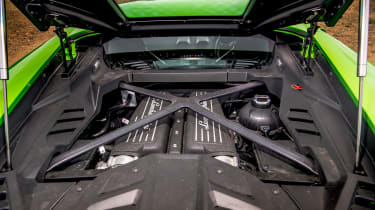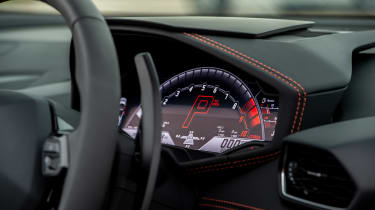Lamborghini Huracán Evo review – engine, gearbox and technical highlights
The 5.2-litre V10 in the Huracán is a simply magnificent combustion engine, and the dual-clutch transmission isn’t bad either.
All Huracáns feature the same underlying 5.2-litre V10 engine, which itself is loosely based on the 5.2-litre V10 found in Audi’s R8 and a few saloons previous to that. This, controversially, was not the case with the previous Gallardo’s 5-litre, that being a bespoke unit designed and built in Sant’Agata. The decision to change to Audi’s unit yielded improvements in fuel injection, plus the extra torque it was able to produce, but trust us when we say there’s been no compromise on character or performance.
The differences between the V10 engine in the Huracán and in an R8 are as vivid and substantial as the difference between listening to a live performance of Vivaldi’s ‘Four Seasons’ in a concert hall and on your iPod. There’s not just more volume to the Lambo V10, but texture, nuance and depth too. It’s a sublime engine, one that feels like an apt culmination of the combustion engine’s journey over its 120 years, almost as if it were designed purely for your entertainment, rather than just providing forward motion.
And as was the case in all Lamborghinis that went before, the V10 engine is always dressed for the occasion, sitting underneath the engine cover with all the glamour and high detail of any bedroom-wall supercar. The engine itself is also dry-sumped, helping it sit nice and low in the engine bay, and there’s a typical collection of top-end goodies such as double overhead cams with continuously variable valve timing for intake and exhaust.
All Huracáns utilise a dual-clutch transmission, and it’s a fantastic unit. Far superior to the single-clutch unit Lambo still uses for the Aventador, with fast response to the paddles, instantaneous shifts up and down the transmission and its gearing is pretty bang on too. Not so short as to need to be constantly pulling the paddle, but not too long as to overreach the V10’s powerband.
The Huracán’s chassis is also a big step up from that of the previous Gallardo, with a hybrid carbonfibre and aluminium structure with double wishbones at all four corners and standard-fit magnetorheological dampers. Evo models also introduced a new electronic brain which centralises all of the electric information from the chassis and powertrain in control of the stability systems.





